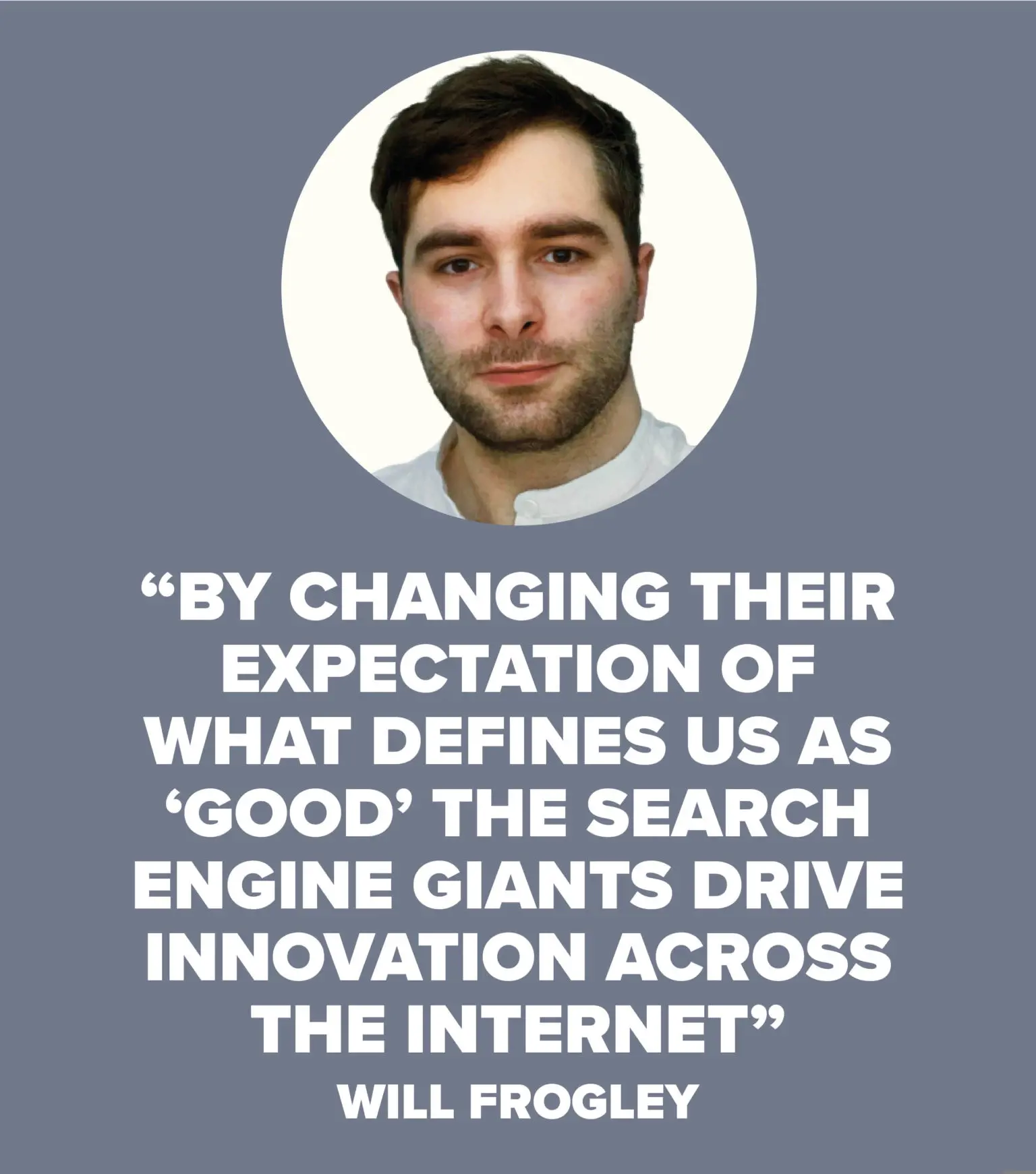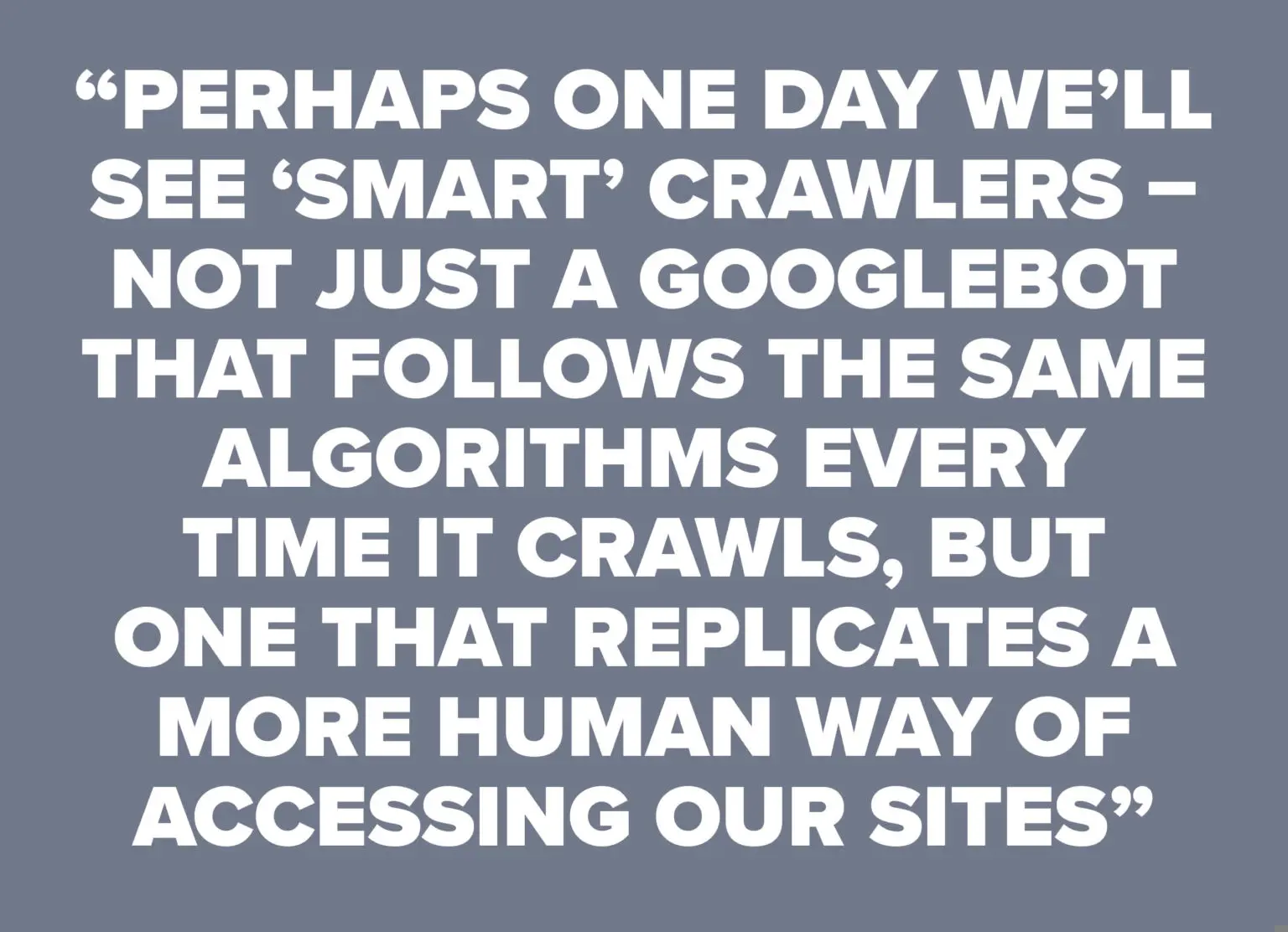

The widespread panic when Google services crashed worldwide in mid-December emphasised just how reliant many industries have become on the search engine giant. WILL FROGLEY looks at how this relationship is set to shape the future of search and what brands will need to do to stay visible.
t’s becoming increasingly hard to ignore the impact search engines have on our day-to-day lives. Whether it’s the way we speak, learn or the way we operate and drive value for our businesses, very few areas of modern life have remained untouched by the reach of Google et al. fantasy (for the time being at least) the way we use, interact with and rely on search engines is still incredibly tangible today. The perfect example of this happened on 14 December 2020 when Google services crashed worldwide, albeit temporarily. From YouTube to Google Maps, the impact of the outage was far-reaching and many industries spiralled into panic.
This is perhaps tantamount to the way we rely on our own websites to be available to Google. After all, it is a two-way relationship. If Google can’t easily understand our content, offering and services, we won’t be rewarded with organic visibility, thereby seriously hampering our traffic and potential for success. This is where the search engine giants harness the full weight of their power over us – through algorithm updates. By changing their expectation of what defines us as “good” they drive innovation across the internet.
For us to remain competitive we must constantly be researching, learning and keeping up to date with the best practices and technologies available. We must enrich our website with not just the services we offer as a business, but with a wealth of content and information around it to champion our knowledgeability, reliability and authority in our industry. After all, as omnipresent as Google may be it is after all a business itself – and its business model for driving revenue from SERPs is the hand that guides us all.

With PPC and Shopping, the revenue streams are clear for Google. SEO? Not so much. So, what can we offer up to the Big G in return for organic visibility?
THE Q FACTOR
The answer by a mile: content. If Google isn’t making money from us in advertising spend, it wants us to offer the user something valuable. One of the prevailing trends of the last few years in SEO is a drive for quality content across the internet. Of late, this has also included the accessibility of this content; in late 2019 we even saw the rollout of BERT, an algorithm update that, among other impacts, targets the use of spammy and unnatural language, therefore driving even further quality in onsite content. It stands for Bidirectional Encoder Representations – the key part being ‘bidirectional’. This means that by leveraging artificial intelligence, Google now has a greater understanding of the context of the words surrounding a keyword and encouraging us to write more natural and enjoyable content rather than keyword-stuffed, meaningless pages.
We can expect more of this. Perhaps one day we’ll see ‘smart’ crawlers – not just a Googlebot that follows the same algorithms every time it crawls, but one that replicates a more human way of accessing our sites. Maybe we’ll see several bots, each with their own ‘personalities’ fed from user search trend and keyword data, which could be a highly effective way for Google to ensure even greater levels of quality and bountiful content from us. But what will this mean for the igaming industry?
As best practice, we should already be optimising from a user-first and mobile-first perspective. This means an elegant user experience, a flavourful site and certifying our authority and trustworthiness within our industry. Far too often we may be relying on technologies like client-side rendering of JavaScript. Given the user interface of many igaming sites requires a complex output, we often see JavaScript utilised to provide strong UX and functionality. Issues, however, come about if we have limited server resource on our end, and shift the rendering of the JS over to the user that requested our site. While we generally accept that only some 2% of users typically have JavaScript disabled, in short this can mean that a bot running a text-only crawl of our site is missing out on being able to explore and index the valuable content we’ve invested so much in. Sure, when Google crawls it comes back in a second wave and renders that JS out, but if a competitor has that content rendered server-side and visible to a text-only crawl in the first wave, they’re making Google jump through fewer hoops and invest less resource. Hence they will not only benefit from a more effective use of crawl budget but will be rewarded accordingly with organic visibility.
TOES IN THE WATER
When AMP (Accelerated Mobile Pages) rolled out, we saw some sites implement this technology with great success. Conversely, some jumped the gun and took a hit to their visibility. Time has since passed and we now have a greater understanding of its appropriate use. We must remember these examples moving forward. As the rate of development pushes forward at an increasingly exponential rate – with no sight of slowing down – we must fully weigh the potential pros and cons of these technologies before rushing in and rolling them out across our sites. Alternatively, if you have a relatively new site, perhaps you want to take the risk of what’s to be gained?
Black Mirror-esque concerns aside, this is a particularly exciting time to be working in digital. The progression of hardware, software and everything from quantum computing to the AI they facilitate represent monumental opportunities for us to shake up the landscape. The monolithic brands that have long commanded an overwhelming stake in igaming must guarantee they’re pushing innovation internally, because you can be sure that there are plenty waiting to pounce with a renewed swipe of ingenuity.

This opens up the door for fresh and unique products, services and offerings that might have previously struggled to secure real estate on SERPs. We must consider what devices our customers are using to access our sites as smart devices around the home offer up potential for further innovation. And while it’s unlikely that anyone is going to start gambling using their refrigerator (although someone did supposedly tweet from their fridge earlier this year), you can expect higher number of people placing bets via their Google Home, Alexa or other smart speaker while watching the game. Rolling out this kind of functionality allows us to remain competitive and provides our users with a more unique offering and experience. Smart TV search is growing, YouTube is a search engine unto itself and wearable tech and devices are increasingly popular, despite how vocal critics may have been in the early days.
BACK TO EARTH
Naturally, there’s a certain amount of speculation and uncertainty here. If we were to go by Ridley Scott’s 1982 vision of the future (well, okay, 2019) in Blade Runner, we’d already be flying around in our cars and chasing down bioengineered humanoids. Despite the Singularity being a while off yet, the one thing we can be sure of is that progress won’t slow. We may well be hampered by pandemics, environmental challenges and political instability, but if 2020 is anything to go by, we can be reassured in the resilience, persistence and adaptability of humans.
Search is a constant in our lives today and should be considered one of the most interesting outputs of human creativity. For all its algorithms, updates and technology, one fact remains paramount when optimising for search: the user. Whichever way your business is heading – particularly for igaming but indeed whatever your industry – remember to always put the user first. Remember to consider their wants, needs and intent, and how you can best meet these three things. As search engines become more intelligent, regardless of the means, this is what will be rewarded. In turn, this is what will be key to your success.

is SEO lead at Blueclaw and will probably want a conversation about AI or futurism when he’s not pondering algorithms. Admittedly that can be a bit heavy pre-coffee on a Monday morning.
